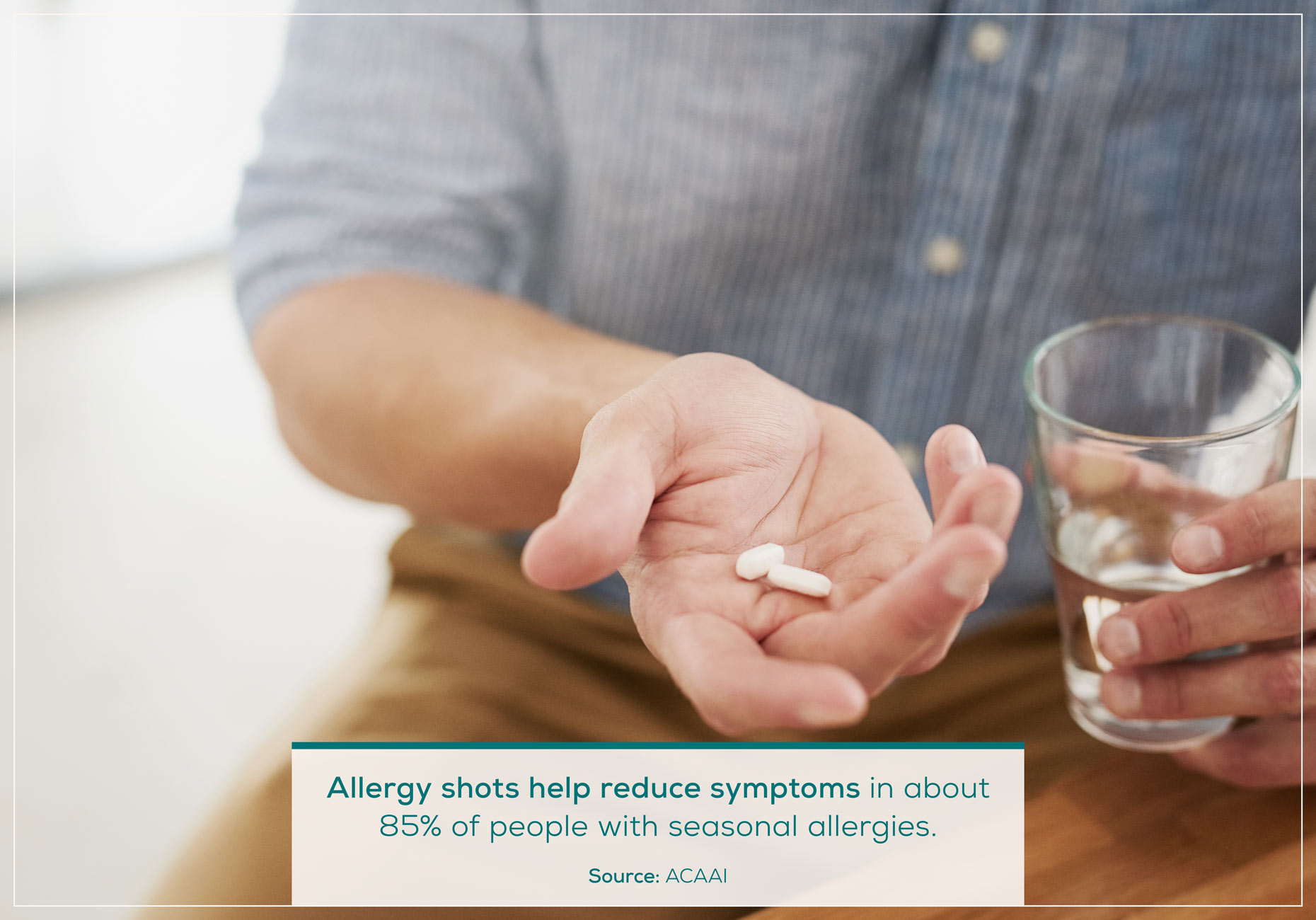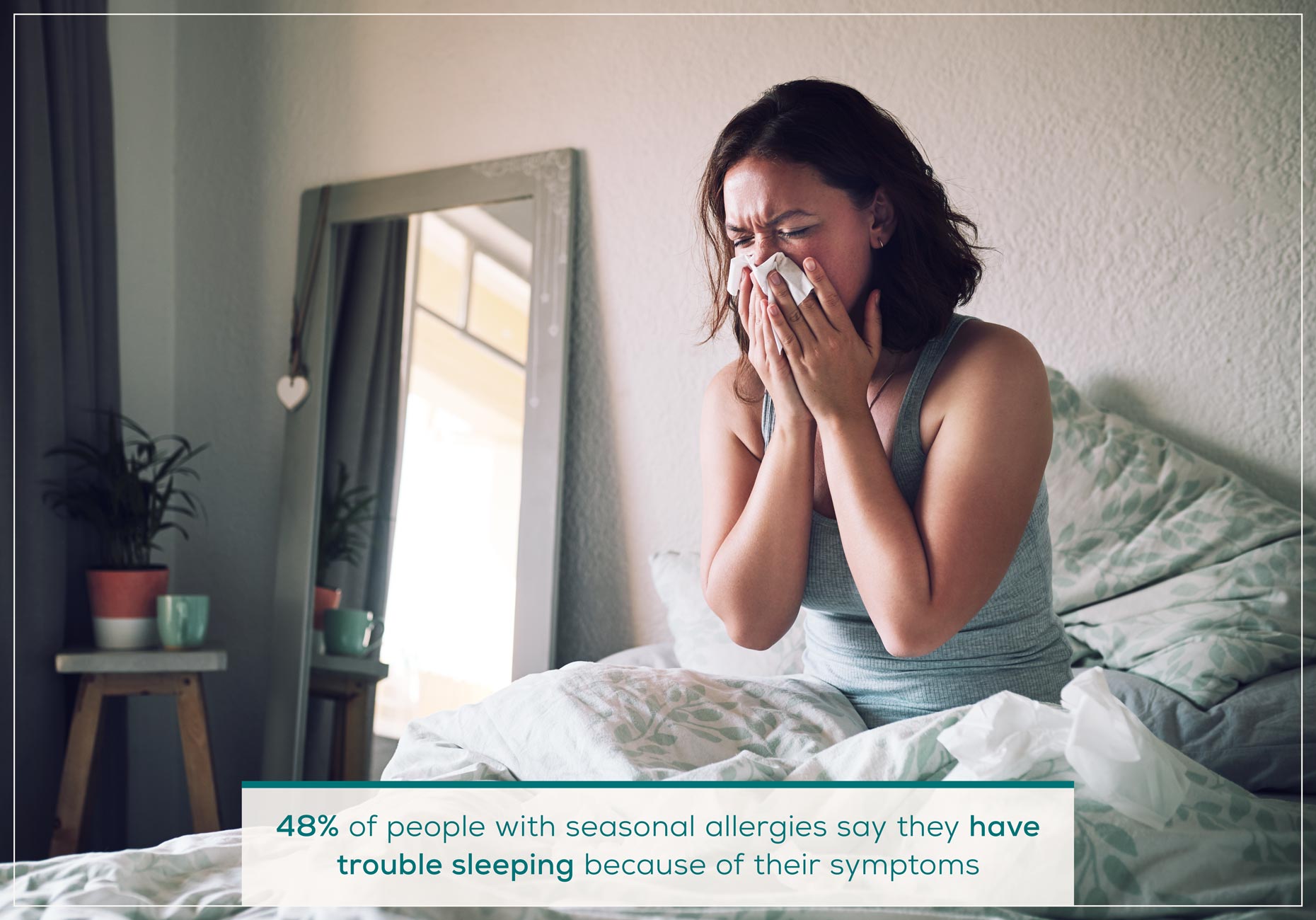
Can Allergies Make You Tired? How to Manage Allergy Fatigue and Sleep Better
Last updated February 4, 2023.
If you’re one of the many people who experience allergies, you’ve likely suffered from common symptoms like itchy eyes, coughing, sneezing, and nasal congestion. But if you also find yourself dealing with fatigue, you might be wondering: can allergies make you tired? Yes, allergies can make you tired and fatigued. There are many ways that allergies can impact your energy levels and cause you to feel tired. In fact, there’s even a name for fatigue caused by allergies—"brain fog”—which can make it difficult to carry out everyday tasks or function at your best.
Allergies occur when your immune system reacts to a harmless substance by mistake. These substances are known as allergens, and can cause a number of uncomfortable symptoms such as itchy or watery eyes, coughing and sneezing, irritated skin, nasal congestion, or a runny nose.
Looking to learn more about the relationship between allergies and fatigue? Read on or skip to our infographic to understand why your allergies may be making you tired and learn tips for combating sleeplessness.
Why Do Allergies Make Us Tired?

In the United States, allergies are the sixth leading cause of chronic illness. Allergens can exist both indoors and outdoors, and it can be a challenge to limit your exposure to them. When it comes to indoor and outdoor allergies, there are a few common culprits that can cause seasonal or recurring allergic reactions such as sinus swelling, nasal congestion or a runny nose, watery eyes, and tiredness. The most common triggers include dust mites, mold, pollen, and pet dander—all of which may cause fatigue.
Allergens Trigger Chemicals That Can Cause Fatigue
Exposure to an allergen triggers an immune response that’s meant to protect you from foreign invaders. Your immune system produces a chemical called histamine, which can cause symptoms like itchiness, swelling, trouble breathing, and fatigue.
Allergies Can Cause or Worsen Sleep Apnea
When dealing with allergy symptoms such as congestion, coughing, sneezing, or a runny nose, you may naturally breathe through your mouth instead of your nose. While this can help increase airflow to your lungs, it can also create or exacerbate another condition called sleep apnea. Sleep apnea causes your airways to be blocked while you sleep, which can interrupt sleep throughout per night. This results in less deep sleep and can lead to waking up with feelings of fatigue.
Certain Allergy Medications Can Cause Drowsiness
Reaching for allergy medications to combat or prevent allergy symptoms might help ward off your allergies, but certain medications like antihistamines may also lead to drowsiness during the day.
Not only can certain antihistamines induce drowsiness during the day, but they may also contribute to poor sleep quality at night, leading to feelings of fatigue in the morning.
Allergies Can Lead to Sinusitis
If you suffer from allergies, you’re also more likely to have sinus problems such as sinusitis. Sinusitis is a condition in which the tissue lining of the sinuses becomes inflamed. The sinuses are responsible for making the mucus that drains out of your nose channels, keeping the nose filled with air and free of bacteria, but inflammation can make it harder for your sinuses to do their job.
While the symptoms of allergies and sinusitis have some overlap—such as sneezing, itchy eyes, wheezing, or a runny nose—sinusitis can cause additional symptoms like pain and swelling on the face, headaches, postnasal drip, and fatigue.
How Can You Prevent Allergy Fatigue?
While there is no cure for allergies, there are several things you can do to manage your symptoms and minimize allergies fatigue.
1. Find the Source of Your Symptoms
To manage your symptoms, start by finding the source of your allergies. Taking a quick allergy test from the comfort of your home can help you narrow down possible culprits.
Keeping an allergy log is another great way to figure out what’s causing your symptoms. Recording notes and identifying patterns when you’re experiencing symptoms of fatigue and jotting down what you’ve been exposed to that day is a great way to find the link between an allergen and your symptoms.
2. Limit Exposure to Allergens
Once you’ve identified the cause of your allergy symptoms, it’s recommended you do your best to eliminate or reduce your exposure to the allergen whenever possible. If you’re suffering from an indoor allergy, there are several easy ways to allergy-proof your home.
For outdoor allergens like mold and pollen, monitoring the allergen count and limiting your time outside during allergy season or high-exposure days are great ways to prevent allergy symptoms and fatigue.
3. Consider Allergy Medication
Medication may be effective in reducing or preventing your allergy symptoms. In fact, immunotherapy (allergy shots) is proven to reduce symptoms in about 85 percent of people with allergies, though you’ll need to discuss this option further with your healthcare provider to determine if it’s an appropriate course of treatment for you.
In addition to allergy shots, over-the-counter medications that contain antihistamines can be an easy and effective way to manage both year-round and seasonal allergy symptoms. Be sure to ask your healthcare provider or pharmacist which over-the-counter allergy medication would be least likely to make you feel drowsy.

4. Visit an Allergist
There are different types of allergies that can potentially affect you and result in fatigue. This can make it challenging to identify what allergen is to blame for your tiredness.
Thankfully, allergists specialize in allergy symptoms and conditions and are trained to identify the triggers that may be causing a reaction. If your fatigue or other symptoms are chronic and/or severe, are negatively affecting your quality of life, and you’re unable to get to the source, an allergist will likely be able to diagnose and treat the problem.
Tips for Getting Quality Sleep With Allergies

If your allergies are keeping you up at night or causing fatigue during the day, it’s important to take the proper steps to get quality sleep (about 7–9 hours) each night. Below are a few simple tips that can help you get a good night’s sleep so you can feel rested and alert during the day, even if allergies are a problem.
Take a Shower Before Bed
Taking a shower before bed can help wash pollen or other allergens out of your hair or off your skin, ensuring that you are not bringing allergens into bed with you. Taking a shower or bath before bed may even improve your ability to get a good night’s sleep by lowering your body temperature, which can help you fall asleep and stay asleep. This should help you feel more rested when you wake up the next morning.
Wash Your Sheets Frequently
We spend approximately one-third of our lives in bed, so keeping your sheets clean and allergen-free is especially important if you suffer from dust mite allergies. To prevent dust mites from making themselves comfortable in your bedding, wash your sheets in hot water once a week.
Keep Your Head Elevated
If you are congested from allergies, keep your head elevated by propping it up on a pillow or two to help eliminate congestion in your sinuses. With your head elevated, gravity will help keep excess mucus from building up in your nasal passage.
Consider Removing Pets from the Bedroom
Since pets can shed hair and dander on your mattress, bedding, and carpet, it’s not difficult for this type of allergen to be all over your bedroom and contribute to pet allergy symptoms. If pet dander is the source of your allergies, consider limiting your pet’s exposure to your bedroom.
Use an Air Purifier
Placing an air purifying device in your bedroom can be a great solution to improve your air quality and allow you to sleep better at night. It helps by removing allergy-causing particles from the air. By removing these allergy triggers, you may find that any sneezing or coughing spells during the night are significantly reduced.
Finding the source of your allergy symptoms, eliminating or reducing exposure, and ensuring you get a good night’s sleep are all ways to help reduce allergy fatigue that may come with year-round or seasonal allergies. Not getting enough sleep, allergy fatigue, or brain fog from allergies can impact your quality of life, so getting to the source of your allergies and finding the best ways to manage them is important.
If you’re unsure about whether your fatigue is from allergies or other factors, consider taking an at-home allergy test or seeing an allergy specialist.
Sources: Cleveland Clinic | Ashtma and Allergy Foundation of America | American Academy of Allergy, Asthma and Immunology | American College of Allergy, Asthma, and Immunology | The Sleep Foundation | National Center for Biotechnology Information, U.S. National Library of Medicine | National Center for Biotechnology Information, U.S. National Library of Medicine
